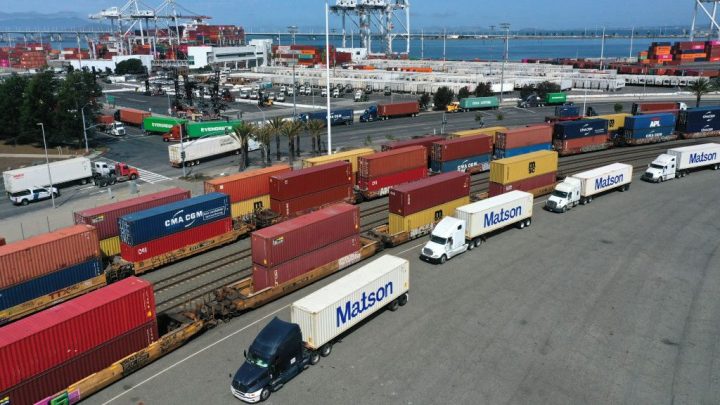
The container price surge is weighing on the customs business
The container price surge is weighing on the customs business

Port congestion and container prices aren’t just weighing on the people trying to ship goods — it also means a lot of potential headaches for the people caught in the middle.
Gretchen Blough is a customs broker at Logistics Plus in Erie, Pennsylvania. While she helps clients comply with duties and regulations, her company also handles supply chain logistics, from transportation to warehousing. Blough spoke with “Marketplace” host Kai Ryssdal about how these supply chain woes are affecting her company. The following is an edited transcript of their conversation.
Kai Ryssdal: Let’s talk containers first, shall we? That is the news of the global supply chain. I imagine it’s a factor in your everyday life, almost from noon till night.
Gretchen Blough: Yes, exactly.
Ryssdal: What are your clients saying?
Blough: Everything has really increased in price. Before the pandemic, the cost for a container was $2,500. Now it can go from $15,000 to $40,000, depending on the lane.
Ryssdal: Do you mean a shipping lane?
Blough: The shipping lane, whether it’s from China or the United Kingdom or the European Union, from India or whatnot.
Ryssdal: Do you have people just saying, “I can’t. I gotta wait this out. I’ll see you in six months?”
Blough: Some of the smaller importers, yes. But in order to keep stock on the shelves and keep the manufacturing lines running, sometimes they just have no choice.
Ryssdal: One of the things I wanted to ask you about was stuff that that just does not fit in containers, like a wind turbine. So what do you do if you have one of those and you need to get it someplace?
Blough: That’s called “breakbulk.” And there are specially fitted ships that will bring those kinds of items into the United States and around the world. And what we’re finding is, because the cost of containers has gone so high that some of those breakbulk ships are being refitted to transport containers. So the space for breakbulk is getting increasingly unavailable.
Ryssdal: So costs for containers are going up, but also the cost for breakbulk is going up as well?
Blough: Correct. And it’s probably quadrupled in the past year.
Ryssdal: How long can this possibly last? I mean, I don’t expect you to have an answer, but holy cow.
Blough: Yeah, exactly. I said the other day that “unprecedented” is probably the most overused word of the past few years. But this is unprecedented. So it’s really hard to say. There’s a lot of retailers and forwarders that are looking into getting their own ships because of the situation to transport things on their own.
Ryssdal: Do you suppose this has an effect permanently? Because these are big, macroeconomic things that are happening, and they’re not going to be turned around really easily.
Blough: No they’re not. I mean, right now we have 50 container ships outside of the Port of LA, Long Beach. So the wait has been just incredible. As an example, our import ops manager was telling me that we paid for expedited shipping premium service from China. The ship was on the water for 15 days, it sat outside the port of LA for 30 days, and then it took 30 days to become available at the container freight station. And that’s expedited service.
Ryssdal: Did you get your money back?
Blough: No, that doesn’t work that way, unfortunately.
Ryssdal: It ought to.
Blough: It should.
There’s a lot happening in the world. Through it all, Marketplace is here for you.
You rely on Marketplace to break down the world’s events and tell you how it affects you in a fact-based, approachable way. We rely on your financial support to keep making that possible.
Your donation today powers the independent journalism that you rely on. For just $5/month, you can help sustain Marketplace so we can keep reporting on the things that matter to you.












